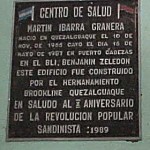In 1989, funding and volunteer support from Brookline led to the construction of the Centro de Salud (Health Center) in Quezalguaque. In 2004, we funded a renovation of the satellite health post in Cristo Rey. Because of space constraints and at the request of the health leadership in Quezalguaque, the Sister City Project funded construction of a new urgent care wing at the Centro de Salud in 2009. Later in the year, the Sister City Project secured $141,000 worth of medical equipment and furniture through the International Medical Equipment Collaborative (IMEC) for the center.
The Centro de Salud is open seven days a week, 24 hours a day, and staffed by physicians and nurses. There are now also two satellite clinics serving outlying areas. Together, the three sites have approximately 30,000 patient visits annually. In late 2011, the Sister City Project committed to funding the renovation of the satellite clinic in Las Mercedes. We also have regularly provided funds for medical supplies and equipment and have funded transportation services, allowing health center personnel to staff the health post in Las Mercedes.
The Sister City Project has also been involved in multiple public health initiatives to combat local and regional problems along with Boston University and Harvard University public health and medical school students. Some of the projects involving graduate student have been: a household survey to identify barriers to accessing primary health care services, · a han-washing and infection control campaign to combat diarrheal disease, · a study of the prevalence of chronic kidney disease, and · a hypertension screening combining referrals to primary care providers and health education. In the summer of 2011, hypertension screening for 1,727 adults was carried out, and almost 200 persons attended health education programs. This effort was organized and offered through a volunteer team that included bilingual graduate students from the Boston University School of Public Health and health outreach workers from Quezalguaque funded by the Sister City Project.

